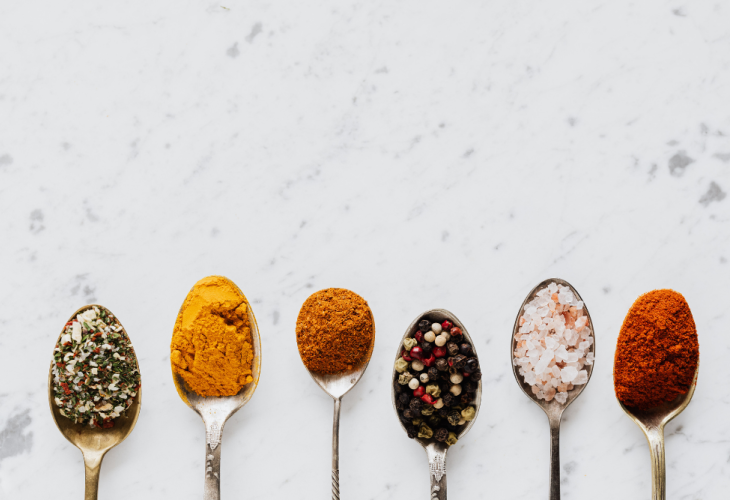Spice Up Your Pantry: Essential Herbs You Need Now
Spices not only enhance dishes with flavor and color, but they also have incredible health benefits. Clinical dietitian Tova Kraus from Clalit explains which spices are must-haves in every kitchen.

No meal is complete without our trusted spices. They add flavor and color, but provide quite a few health benefits as well. Here are the spices your kitchen cannot be without:
Turmeric – Cancer Fighter and Alzheimer's Preventer
Turmeric is rich in antioxidants. One of them, curcumin, is considered highly active and is known for its anti-inflammatory and antioxidant properties. It is believed that curcumin protects our DNA from damage and may prevent cancer. Curcumin may also prevent cholesterol oxidation in the body, a process that leads to heart and vascular diseases. In the past decade, studies have explored turmeric's potential to reduce the risk of Alzheimer's.
Nutritionally, turmeric is rich in potassium and iron, with a teaspoon providing about 5% of the daily iron intake needed for women and 11% for men.
It's recommended to add it to stews, soups, vegetables, legumes, fish, and meat.
Cinnamon – Boosts Focus and Memory
Studies show that cinnamon contains anti-inflammatory, antioxidant, cholesterol-reducing, tumor-preventing agents, and it influences the immune system. Additionally, it is speculated that the compounds in cinnamon may slightly lower blood sugar levels in type 2 diabetics.
Cinnamon contains oils that prevent the growth of bacteria and fungi, making it a natural preservative. It also appears to aid concentration. In a study, participants who smelled cinnamon scored higher on attention and memory tests, whereas other scents did not yield the same effect.
Cinnamon is typically added to baked goods, but it can also be included in yogurt, coffee, and stews.
Cumin – Supports Digestion
According to research, cumin may enhance the secretion of digestive enzymes from the pancreas, aiding proper digestion and gas prevention. Two compounds, apigenin and luteolin, isolated from cumin have demonstrated cancer-fighting activity. Additionally, cumin is an excellent source of iron, with a teaspoon containing 16% of the daily recommended intake for women, and 35% for men.
Cumin can be added to a variety of dishes such as mujaddara, bean soup, patties, and meat.
Paprika – Anti-Inflammatory Benefits
Paprika is made from dried and ground hot chili peppers or a combination of regular red pepper and chili pepper. The compound that gives paprika its spiciness is called capsaicin, which is known for its ability to block cancer cell division and its anti-inflammatory properties.
Just one teaspoon of paprika provides over 100% of the daily required amount of Vitamin A for both men and women.
Paprika is added to sauces, shakshuka, soups, meat dishes, and oven-roasted vegetables.
Black Pepper – Antioxidant and Gas Prevention
This black powder is actually dried and ground berries from the pepper tree. The round berries are picked while still green and sun-dried until they darken, while a shorter drying time yields white pepper.
Black pepper stimulates the taste buds on the tongue, signaling the stomach to increase its acid secretion. Since stomach acid is essential for proper digestion, black pepper is credited with improving digestion and preventing gas. This spice is also rich in antioxidants and antibacterial agents.
Add black pepper to any dish – from salads and soups to legume dishes, meats, eggs, and fish.

